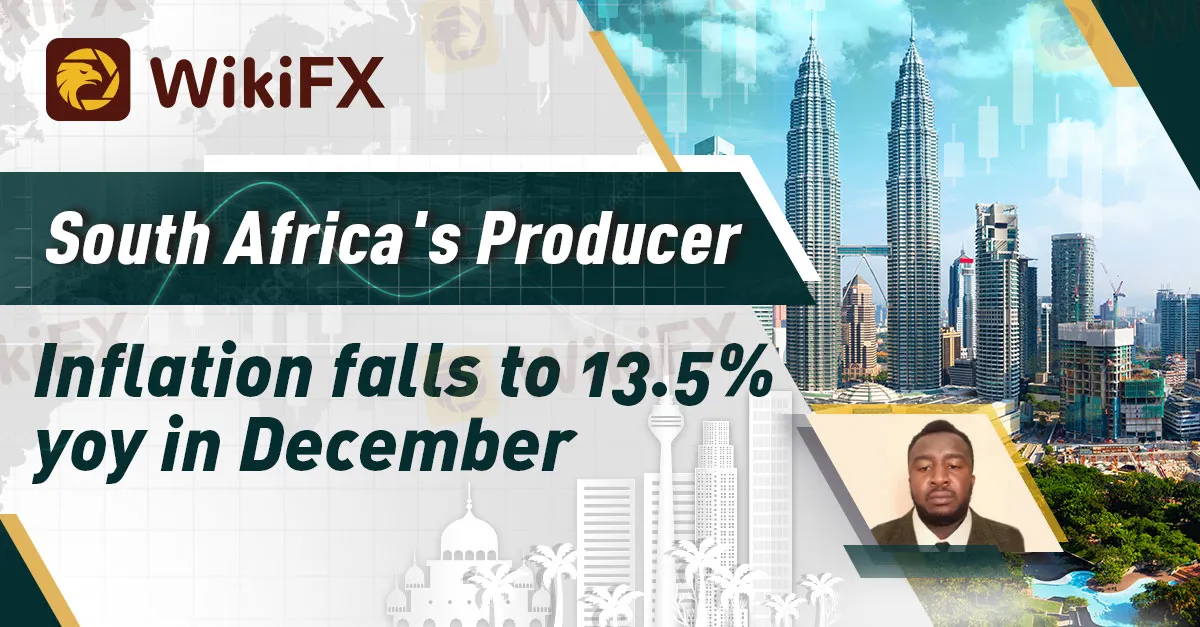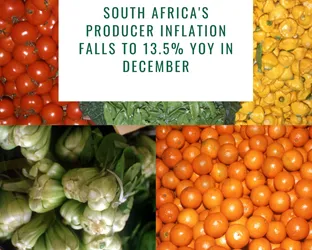简体中文
繁體中文
English
Pусский
日本語
ภาษาไทย
Tiếng Việt
Bahasa Indonesia
Español
हिन्दी
Filippiiniläinen
Français
Deutsch
Português
Türkçe
한국어
العربية
South Africa's Producer Inflation falls to 13.5% yoy in December
Abstract:South Africa's producer inflation slowed to 13.5% in December, compared to 14.5% the previous month.

By: Chime Amara

Johannesburg - South Africa's producer inflation slowed to 13.5% in December, compared to 14.5% the previous month, according to the latest data released by Statistics South Africa.
The slowdown in producer inflation, which measures changes in the prices of goods at the factory gate, was largely due to a slowdown in the prices of food and non-alcoholic beverages. This comes as a welcome relief for South African consumers, who have been facing rising costs of living in recent months.
The country's central bank, the South African Reserve Bank, has been closely monitoring the inflation rate and has indicated that it is prepared to take action to curb any further rise in prices.
Analysts predict that the slowdown in producer inflation could lead to a slowdown in consumer inflation, which measures changes in the prices of goods and services for households. This would help to ease the financial burden on South African consumers, who have been struggling with high levels of unemployment and slow economic growth.
Despite the slowdown, however, the producer inflation rate remains well above the South African Reserve Bank's target range of 3% to 6%. The bank has indicated that it will continue to closely monitor the inflation rate and take action to keep it within the target range.
The latest inflation data is expected to have a positive impact on South Africa's economy, which has been facing several challenges in recent years. The country's government and the central bank will be hoping that this slowdown will help to boost consumer confidence and encourage spending, which is critical for economic growth.
Above all, the slow down in South Africa's producer inflation to 13.5% in December could be considered as a good news for consumers and the economy, but the country still has a long way to go in bringing inflation down to its target range.

Disclaimer:
The views in this article only represent the author's personal views, and do not constitute investment advice on this platform. This platform does not guarantee the accuracy, completeness and timeliness of the information in the article, and will not be liable for any loss caused by the use of or reliance on the information in the article.
Read more

The Impact of Interest Rate Decisions on the Forex Market
Interest rate changes determine currency attractiveness, influencing capital flows and exchange rate trends. Understanding this mechanism helps investors navigate the forex market effectively.

How a Housewife Lost RM288,235 in a Facebook Investment Scam
A 47-year-old housewife in Malaysia recently fell victim to an online investment scam, losing a substantial sum of RM288,235 after engaging with a fraudulent scheme advertised on Facebook.

Interactive Brokers Launches Forecast Contracts in Canada for Market Predictions
Interactive Brokers introduces Forecast Contracts in Canada, enabling investors to trade on economic, political, and climate outcomes. Manage risk with ease.

Bank Negara Malaysia Flags 12 New Companies for Unauthorised Activity
Bank Negara Malaysia (BNM) has updated its Financial Consumer Alert List (FCA List) by adding 12 more entities, reinforcing its efforts to warn the public against unregulated financial schemes. Check if your broker made the list!
WikiFX Broker
Latest News
TradingView Brings Live Market Charts to Telegram Users with New Mini App
Trump tariffs: How will India navigate a world on the brink of a trade war?
Interactive Brokers Launches Forecast Contracts in Canada for Market Predictions
Authorities Alert: MAS Impersonation Scam Hits Singapore
Stocks fall again as Trump tariff jitters continue
INFINOX Partners with Acelerador Racing for Porsche Cup Brazil 2025
Regulatory Failures Lead to $150,000 Fine for Thurston Springer
April Forex Trends: EUR/USD, GBP/USD, USD/JPY, AUD/USD, USD/CAD Insights
March Oil Production Declines: How Is the Market Reacting?
Georgia Man Charged in Danbury Kidnapping and Crypto Extortion Plot
Currency Calculator







